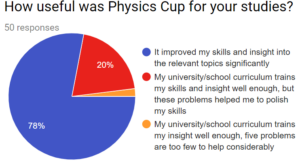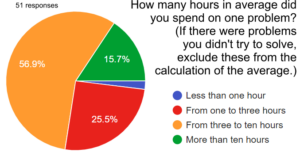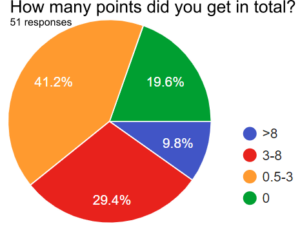October 17th 2025
After the Physics Cup 2019 and Physics Cup 2018, a poll was made among the participants. Here will be a summary of the obtained feedback which will be published step-by-step, according to my (JK) available time.
Physics Cup 2019.
Overall 55 participants filled in the feedback form; big thanks to everyone who did that! In what follows, you’ll find a summary of the feedback.
1. The favorite problems.
Almost half of those who responded – 27 – voted for the added mass problem as the favorite one; in addition, 7 participants listed this as their second-favorite problem. Only 3 students selected it as the least favorite problem.
The second and third places were fairly close in ranking: the foci of the trajectories problem got 8 favorites, 19 second-favorites, and 8 least-favorites; the resistor grid problem got 7 favorites, 15 second favorites, and 3 least-favorites.
Cooling ice problem got also 7 favorites, but only 5 second-favorites and 9 least favorites.
Finally, the echelle grating problem got only one vote for favorite, 4 votes for second-favorite, and a whopping 21 least favorites. The reason why the echelle grating problem was not very popular lies probably in its difficulty – very few students were able to solve it, and weren’t able to enjoy the beauty of the diffraction pattern geometry.
At the bottom of this page, you’ll find selected quotes from the feedback regarding individual problems.



Comments from the participants:
Most of these problems had 2-3 key ideas (for example idea about directrix in the problem about foci). I think it would be good idea to have at least 1 problem that have more than 5 steps to the correct solution. Response: I’d happy to have such a problem, too, but I could probably publish the solution of such a problem in Nature, or at least in Physical Review Letters, instead…(I’d say good papers in such journals have one novel idea, few old ideas + a lot of work.) Jokes aside, I always try to have at least one or two really difficult problems, and the number of key ideas is only one measure of difficulty, perhaps more important is how non-trivial are those ideas.)
It would be great if each problem after the contest were given a story on how it came to authors mind. I think this will help us to even think beyond just a solution and help us appreciate the beauty. Response: I’ll consider this proposal, perhaps I’ll write something in the Facebook page, or here.
I think that would be better if the hardest problems (with less correct solutions) were worth more points than the others at the end. Response: there are cons and pros to this proposal; for the time being, I’ll not implement it because it may discouraged less-prepared participants when they feel that they have no chance of catching up to the leaders. A pro-argument would be that it will motivate to make more efforts on the most difficult problems. Let us keep this option open for the future.
It would be better if we knew about our solution situation as quickly as possible to correct our mistakes soon, to don’t lose the time bonus. It means that to have to wait until Sunday to know about the solution discourages some participants. So, it would be better if it were changed. Response: I’d like to keep this competition format closer to real research when it is the obligation of the researcher to make all he/she can to pinpoint possible errors before publication by himself/herself. Also, since I (JK) am managing the submissions mostly alone, it would also add more workload, which I really cannot afford …
1 easy problem (like Cooling ice) , 2 medium problems (like Added mass), 1 hard problem (like Echelle grating), and 1 very hard problem (like problem 3 from 2018 or harder). Response: yes, that’s an ideal balance, I’ll try my best!
It would be nice if you could improve the hints. Sometimes they are too vague and don’t help me solve the problem and sometimes they are just too hard (talking about things I never heard of) and I don’t understand a thing. I suggest you give tips about WHERE we can study the topics of problems (like a book) at the level of the contest so we can get better at the topic until the end of the month and maybe solve the problem. It would be nice if we students could learn the topic at a higher level (above high school) by ourselves at home, but it seems almost impossible for me even after trying many problem for months (sometimes most of the day searching for it) and using recommended books like Griffiths. I realized most people who got high scores have instructors that prepare them for Olympiads, while others who study by themselves are lost about how to learn the topics and struggle. Please make it easier for people like the former to be more capable of improving their skills and participate/enjoy the contest. Even though I never scored in the 2 years I participated, it was fun to try and I thank you for your time correcting the solutions and organizing everything. Response: I’ll see what I can do. I myself am not very fluent in all the available textbooks apart from some old Russian books (like Sivuhin) and my own booklets, sorry… I hope the “Posts” section could be useful this time, I’d encourage students to exchange useful literature titles here (but no further hints!! only literature lists!)
Just keep doing the good job. Also, please make problems that require less algebra from the next time onward. Problems that need too much algebra are a downer for me. Response: I don’t like too much algebra, myself, the question is, where starts “too much”… Regardless, I’ll try to keep algebra to minimal levels.
Overall, this year’s problems were somewhat easier than in previous years; all but the last problem were correctly solved in less than a day. Having some easier problems encouraged more people to take part, so it’s not necessarily bad. At the same time, I wish there had been one “ridiculously hard” problem like Q3 2018 and maybe one like Q5 2018, which had some very interesting “new” physics. That said, I had great fun working on the problems and think the competition helped me improve a lot. Response: I, on the other hand, got a feeling that you yourself got much better, and Problems 1 and 5 were not necessarily easier than Q3 and Q5 from 2018. Yes, I’ll try to have some really difficult problems in the set.
The problems were great but some of them were not close to a real life application. I would have liked a problem which involves phenomena of different nature (e.g. electromagnetism, optics, relativity…), because in nature processes have influence of many variables. My idea is to include problems in which the relation of variables is not obvious, by that way the problems can be closer to modeling real life phenomena (i.e. closer to research problems). It could be interesting to solve a problem that is out of the IPhO syllabus (of course giving the necessary information to solve it). Response: You are right in that good physics problems are the problems which have a connection with reality, let us leave something to mathematicians, too! However, sometimes a method in itself is also useful: even if the specific application is not very realistic, and with more math, including numerics, the method might prove to be useful for realistic problems, too. I’ll definitely give preference to realistic problems if other aspects are equal between a set of problem candidates.
I think you should differ the score based on hints they got before they could solve the problem, rather than give them all the same score of 1. (Aside from the bonus). Response: Yes, this is implemented now!
It would be great if a well written solution was provided by you or some other professor at the end of each month as the student solutions published are quite often written by hand and sometimes hard to follow for someone who has not solved the problem. Response: Yes, but that would take too much time from me. Also, I was happy to have some really nicely written solutions from the contestants, I couldn’t have done much better…
It would be helpful if we get sent a pdf file with solutions to all problems after the end of the Physics Cup. Response: No commitment, but we’ll study if we have enough hands to do that.
I was one of the few who solved the echelle grating question – in hindsight it wasn’t actually that difficult. I think the reasons people found in hard are:
1. Optics is boring – there are very few interesting optics problems to train with
2. Optics often isn’t taught well (in my experience)
3. The problem asked for a sketch rather than a definite mathematical answer, which leaves more uncertainty about what is actually required.
Response: Thanks! I also thought that the problem wasn’t THAT difficult… I know that the question was not very well-defined, but that was the only way to expose the beauty of this setup…
I hope this happens throughout the year like every month we get a problem. I agree it might be hard to tabulate all the answers pouring in but it sure might improve my application of concepts in the long run. Response: Thanks! I’ll consider this when I’ll retire, and former contestants will be providing me with a steady flux of new problems.
It would be very interesting if we’d get problems on familiar topics at the next year,because it increases our confidence. Response: There will be at least a couple of easier problems!
Can bronze medalists get a shirt please? Response: Hopefully…
I suggest that the competition should be shorter, with a problem every 2-3 weeks and less hints, 1-2 per problem. I liked the distribution of medals, but I suggest that following editions rewards every medalist with a T-shirt and a printed diploma instead of only silver and gold ones, and maybe a smaller number of bronze medalists and the creation of a honorable mention category. I also want to thank you for the opportunity and I hope you keep creating lots of neat problems for next editions! Response: Having more hints and longer period will give opportunity to those who are not that well prepared and need more time to study the topics. As for medals, honourable mentions, and T-shirts, we’ll consider this suggestion.
The last problem came out during exam time, so I didn’t spend much time on it. Response: This year, the competition is shifted by a month, hopefully there will be no exams during the last problem …
Selected quotes from the feedback regarding specific problems.
Added mass.
The first problem is elegant and beautiful. Using electricity as an analogy for the motion of the fluid is interesting and requires deep thinking to obtain the correct idea. A good understanding in the physical concept is also strongly needed
Very beautiful idea: i was very surprised that there is a relationship between added mass and polarizability.
It really tested a lot of my concepts. Though I did not get it in the end. It made me learn a lot. A lot especially was learnt from scratch for me when I tried to solve this problem.
Mostly because of the non-intuitive idea of using fluid boundary conditions in the electric equations to make the solution work. I also learned a lot researching for mathematical tools in several books and research papers.
Thanks this problem I understood how permittivity is connected with dipole moment density and surface charge.
The analogy of the E-field and fluid flow was extremely interesting to work with and the solution required multiple non-standard arguments. One great accomplishment was that it tested one’s understanding of the mathematics, while still being solvable with Olympiad-level knowledge. In the process, I learned about boundary conditions for dielectric media. In short – it combined everything great about Physics Cup problems! The only way it could have been better is by not making part of the intended solution (E-field analogy) obvious in the problem statement (not sure if that is possible).
Against:
The wording in the question was slightly vague as to what exactly was occurring.
Foci of the trajectories.
I love geometrical solutions.
It was an exercise where I could prove some cool properties and deduce an easy but fascinating result.
I think it is quite easy and doable
This problem took me a great deal of time. Although i had solved it within 3 days, but i had to work nearly 10 hours per day. At some time, i had thought I wouldn’t be able to solve it. But then hallelujah!!!
I already knew this problem from Rudolf Ortvay competition in Physics. Even so, I could not solve it. (Remark: it appears that this problem has been a part of Rudolf Ortvay competition, but neither me – JK – nor Máté Vigh were aware of that when publishing the problem. Luckily, Rudolf Ortvay competition problems don’t have published solutions.)
The beauty of this problem is that it seems very easy but the shortest solution was very tricky .
My solution used method of brute force and had a huge amount of algebra. It gets a second place from me because of the feeling after I received geometric solution that took 1/4 of the page. Also a good example how mathematics (geometry) can simplify a physics problem.
Against:
I found it too easy.
I think it is a boring, purposeless kinematics problem.
Very subjective, but I am not too keen on geometry, and the result being a straight line seemed somewhat anticlimactic. Also, it seemed more like a physically motivated mathematics problem than a physics problem. (That is not to say that it wasn’t objectively a good problem, just not my style).
Although I only did this problem, this problem contains a lot of mathematics and no special ideas.
Resistor grid
It introduced me to a lot of new interesting concepts.
I like this problem most, because at first it seemed very hard to solve. Using some features of electric potential distribution, it turned out to be quite easy.
The application of the superposition principal was very interesting
Avery clever use of superposition principle
The problem was looking much harder than the rest of the previous problems. But when i looked deeper into the grid characteristics, used the superposition principle and finally got a sensible voltage equation, I knew right then that I have solved it. I mean I thought the solution would be much more complex. That’s why I like this problem for it’s simple approach.
Against:
I think it’s too mathematical.
Very analytical.
Cooling ice.
I got somehow an insight to thermodynamics by solving this problem. It helped me much.
Instead of focusing on mathematical abilities, it focused on basic laws of thermodynamics.
I believe it represents the most elegant physical situation among all five problems.
It was counterintuitive how extremely small temperatures can be achieved using extremely simple systems.
Against:
This problem can be considered difficult only if you don’t know about entropy. Otherwise you just need to write the most common equations of thermodynamics.
Too straightforward, in order to have a chance at speed bonus it was necessary to start working on the problem as soon as it was revealed.
Echelle grating
Great idea! It demonstrates the ability of theoretical physics to predict something that can be seen in nature.
What I like from problem 5 is the idea of the jumping between two lines.
Unfortunately, I did not have enough time to make a serious attempt. If I did, it might have ended up as my favourite. This problem combined a solid grasp of the basics with some real physical and geometric insight. It was the most technically demanding and may have been a little tedious (not necessarily bad – physicists have to be able to deal with that), but the conclusion – the most interesting result of this year’s competition, I think – is rewarding enough to make up for that.
Against:
I did not understand how the diffraction was happening. Even after the hints I had a lot of doubts. That I would still blame my conceptual understanding. So I definitely loved the problem after I read through the solution but I really felt sad that I couldn’t attack it.
The hints didn’t help me too much at that problem, because I needed help at the “end” of the solution and they are related to the beginning.
I had tried much hard but couldn’t solve it correctly. But when i saw the solution, i understood that it wasn’t a problem to be solved with my understandings of optics in high school level. I haven’t even understood the theory of this problem properly.
This problem seems to be unclear, and I feel uninspired to attempt.
Too technical .
(to be continued)
